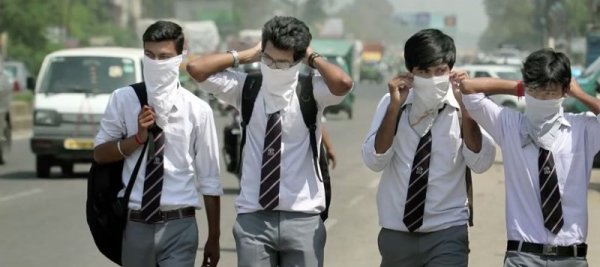Inhaling The Air In This City Is Equivalent To Smoking 45 Cigarettes A Day
 By Amanda Froelich Truth Theory
By Amanda Froelich Truth Theory
If you’re planning a trip through New Delhi, India, you might want to alter your travel plans. This is because toxic air has become a chronic condition in city of 22 million, with air pollution levels close to 30 times the World Health Organization’s (WHO) limits. In some parts of the city, the air quality index (AQI) readings have hit 999. That’s the equivalent of smoking 45 cigarettes a day!
The AQI is based on measurements of PM 2.5, the tiny particulate matter pollution that is created through combustion. As Quartz reports, particulates are released by burning coal, running diesel engines, and the burning of crops and trash in neighboring states. The problem with PM 2.5 is that it is small enough to slip into the lungs and aggravate conditions, such as asthma. The particles can also contribute to a range of health effects and cause a shorter lifespan.
Local residents are well-aware of the air pollution epidemic. New Delhi businessman Nishank Dadu told the BBC: “I feel breathless even inside my car. I can’t keep the windows of my house open. Delhi has become a gas chamber and nobody seems to be doing anything to improve the situation.”
The smog is so thick, it’s even been blamed for car crashes — including a 24-car motorway pileup just outside of New Delhi. Because air pollution in the Indian capital is worse than normal, the Indian Medical Association issued a public health emergency warning, urging administrators to finally “curb this menace.” All schools in the city have since been shut down, leaving five million students to toil at home. They can’t learn because the air is too toxic to breathe.
“Due to the deteriorating air quality in Delhi, the health of children cannot be compromised,” said Manish Sisodia, New Delhi’s deputy chief minister, in a tweet. “We have ordered the closure of all the schools in Delhi until Sunday.”
PM 2.5 isn’t the only class of air pollution residents need to be wary of. Air pollution molecules, such as polycyclic aromatic hydrocarbons in diesel exhaust, increase one’s risk for cancer. Other pollutants can affect the brain, impair immune development in utero and make it harder for those exposed to fight infection later on in life.
Every year, chronic exposure to air pollution causes roughly 7 million people to die prematurely. To reduce the amount of particulates in the air, consumers can make a conscious effort to walk or bike to work/school rather than drive, eat a plant-based diet which has a lower carbon footprint, and share this article to raise awareness about the conundrum.
What are your thoughts? Please comment below and share this news!
Read more: Revolutionary Scarf Filters 95% Of Airborne Contaminants To Combat Air Pollution
Image Credit: Indian Express
I am Luke Miller, content manager at Truth Theory and creator of Potential For Change. I like to blend psychology and spirituality to help you create more happiness in your life.Grab a copy of my free 33 Page Illustrated eBook- Psychology Meets Spirituality- Secrets To A Supercharged Life You Control Here
Leave Comment: